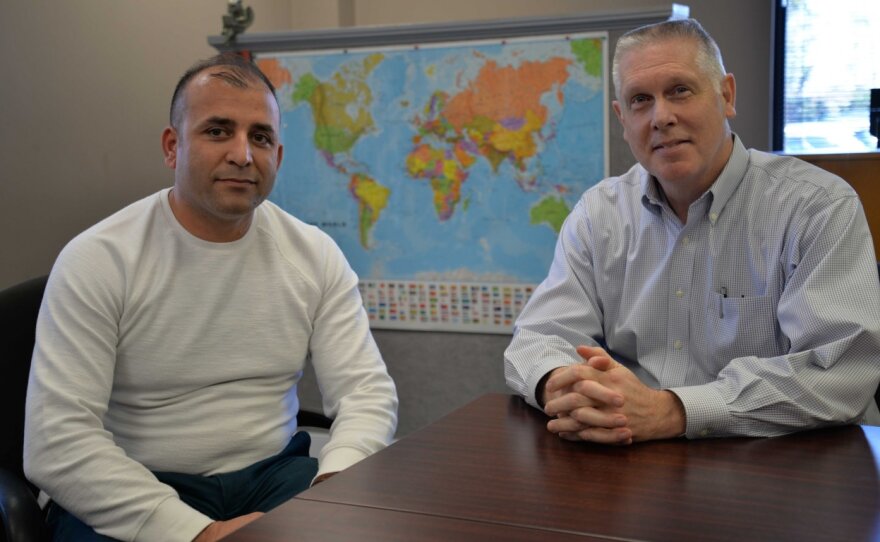Inside Najib Naseri’s office at Church World Service (CWS) Richmond there is a colorful map of the United States. Naseri says in the first days of a refugee’s arrival they sit in his office and find their new home -- Richmond, Virginia.
Before Naseri immigrated to America, he worked side-by-side with the U.S. military in Afghanistan as a translator. Because of this, his family was targeted, and an attempt was made to kidnap his daughter. Naseri made the difficult decision to leave behind his extended family and apply for a Special Immigrant Visa to move to the U.S.
“When I came to America,” said Naseri, “I was thinking of when I go there, I don't have nobody who is going to be there, who is going to help me there?”
When Naseri arrived at the airport there was a CWS caseworker to greet him. In 2015, CWS hired Naseri because of his ability to speak five languages. But because of low refugee admittance numbers, his work is soon coming to an end. The Church World Service office in Richmond will close this Fall.
The closure comes as the number of refugees vetted and admitted into the United States continues to drop. This year marked the lowest number of refugees resettling in the states since the signing of the Refugee Resettlement Act in 1980.
The president sets the “admissions ceiling,” or the limit for the number of refugees allowed to enter the U.S. each year. Often this number is an indication for resettlement agencies to help prepare their workload and budget for the coming year. While the president has control over the ceiling, the actual number of arrivals can be far less than the projected number. For example in 2003, President George W. Bush set the number at 70,000, but about 28,000 refugees were admitted. Last year, President Trump set the number at 45,000 and about 22,000 refugees were admitted.
Source: U.S. State Department, Refugee Processing Center: Refugee Admissions Report February 28, 2019. (Graph: Angela Massino/WCVE)
For each resettled refugee, the State Department provides approved agencies like CWS funding through the Reception and Placement (R&P) grant. The grant is $2,175 per resettled refugee, and supports rapid resettlement efforts for a person or family over a 90 day period. Jen Smyers is the national advocacy director for Church World Service. She says that funding doesn’t go very far.
“[You’re] talking about a down payment on an apartment, three months of rent, furnishings, food in the fridge, food in the pantry, and everything that you need to live on for three months,” said Smyers.
Along with serving a refugee’s immediate needs, the grant also funds a resettlement agency’s operating costs, like staffing and translation services. Resettlement agencies often supplement federal funding through small grants and community donations. The R&P grant however, is critical to the function of a resettlement program.
Late last year, the U.S. State Department requested the nine agencies that work on national resettlement efforts to submit a plan indicating which local offices would no longer receive the R&P grant. The week before Christmas, the CWS Virginia Director, John Baumann received a call from the organization’s national office.
“I think this had been coming for so long that I don't know that I would describe it as any kind of a shock. We had talked about it at staff meetings here.”
Originally, CWS national planned to reduce capacity at the Richmond office and focus on long-term programming rather than “reception and placement.” It soon became clear, without new arrivals CWS Richmond loses both a primary source of funding and their primary directive to resettle refugees. The organization decided it was best to finish up the local office’s current caseload and officially close this coming September.
CWS Richmond Caseworker Najib Naseri with a recent community donation of car seats for refugee clients. (Photo: Angela Massino/WCVE)
There are still two other resettlement agencies in Richmond: Commonwealth Catholic Charities and the International Rescue Committee. Baumann says these offices will likely see an influx in new arrival cases, even with the low admittance numbers. His primary concern though is the impact of the office closure on Richmond’s future ability to resettle refugees if national policies change with a new administration. “When an office closes, you can't just in two years decide to reopen,” said Baumann. Between organizing a volunteer network to building trust in the community, closing the office means dismantling these connections.
Baumann is most worried though about letting go talent like Najib Naseri.
Naseri wants to continue working with refugees in some way. For now, he plans to volunteer with other local groups and nonprofits, like the Henrico fire department, to put his language skills to good use. Even though his professional future is unclear, he is safe here and says he worries about others working for the United States back in Afghanistan.
“There is a lot more SIV interpreters in the line to come,” said Naseri. “They are hoping -- I mean their life is really in danger.”
In 1962, Church World Service was known as the Virginia Council of Churches and they began by resettling Cuban refugees. Since then, they have resettled about 8,000 people in the Richmond area.




